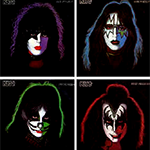[one_third][alert type=”blue”]
Released: Sept 18, 1977
Label: Casablanca Records[/alert][/one_third]Now we come to what, at least at this point, was the most maligned moment in KISStory… the solo albums. In 1978, KISS was at the height of their commercial powers. Manager Bill Aucoin and Casablanca devised an ambitious plan that would maximize the band’s earning potential while easing creative tensions in the band… they would release four solo albums, one from each member, simultaneously on the same day. Needless to say, the executives and management were doing a ton of blow at the time.
Casablanca spared no expense in recording the albums. They spent $60,000 building a home studio in Ace’s house. Paul Stanley started recording his album at one studio, decided he didn’t like the vibe, and spent tens of thousands of dollars upending the entire production and moving it to another studio because he could. Gene Simmons brought in a cavalcade of pop luminaries, ranging from Cheap Trick’s Rick Nielsen to Helen Reddy to guest on his album and even made an unsuccessful attempt to get The Beatles to appear on the album. None of the members appeared on the other threes albums.
Peter Criss’ album is by far the greatest departure from the group’s sound. He wanted to showcase his love for classic R&B but unfortunately, he couldn’t sing like his soul heroes and the production made it sound like a particularly awful Leo Sayer album.
Meanwhile, Paul’s album veered closest to the KISS discography. He even hired the ringer brought in to replace Ace on the studio tracks of Alive II, Bob Kulick, to play lead guitar. It’s also probably the biggest letdown of the solo albums. Peter’s is way worse but you expected more from the principal songwriter for KISS. I guess since most of his songs made the band’s albums anyway, he didn’t exactly have a backlog of great songs just waiting to be released for the world. It does include a few decent-to-good rockers and one flat out great song “Wouldn’t You Like To Know Me?”, which really shows off Paul’s Raspberries influence.
Gene’s album, if you couldn’t tell by the list of the guest stars, is really, really fucking weird. I actually enjoy the album for the sheer audacity of it all and I think it’s the second best of the solo albums (almost by default) but objectively speaking, it’s more of an interesting misfire than a great (or even) good album. The album opens with an awesome, balls out rocker “Radioactive” that features Joe Perry on lead guitar and Bob Seger on backing vocals. If it were included on a KISS album, I believe it’d be considered one of their all time best. Then it gets really fucking weird. There’s the typical dumb sleaze rock you’d expect from a Gene Simmons solo album, but also a weird, baroque pop tribute to Lon Chaney (“Man of 1000 Faces”) , a shockingly good Help! era Beatles homage (“See You Tonite”), and it all ends with an un-ironic cover of “When You Wish Upon A Star” where Geno legit broke down in tears during the recording of it. If you ever want evidence that Gene Simmons actually has a soul (albeit a very, very bizarre fucked up one), then this is the album for you!
Surprisingly, the KISS solo album that many had the lowest expectations for was the one that was by far the best of the four. Unlike Paul, Ace did have a bunch of songs that he’d been waiting to unleash. Ace’s album is just some great, straight up ’70s arena rock. Ace didn’t need a bunch of big named guest stars, he just got Eddie Kramer back behind the boards and a group of killer session players. It’s no surprise that it ended up being the biggest seller of the four but it was a bit surprising that the album’s cover of British glam rock also ran Hello’s UK hit “New York Groove” became a Top 15 hit and the only song from any of the four solo albums to have any traction on the charts.
Casablanca spent $2.5 million dollars marketing the album and shipped five million copies of the albums, guaranteeing that each would go platinum. All four albums would debut in the Top 50 of the Billboard charts but ultimately, many of the copies that Casablanca printed up would be returned to the record stores. At the end of the day, all four albums combined to sell the same amount that Love Gun did. To add insult to injury, one month later came KISS’acting debut, KISS Meets The Phantom of The Park, another attempt to lessen the band’s workload and expand their popularity, It was described as Star Wars meets A Hard Day’s Night. The production was a disaster with Ace & Peter becoming frustrated with the slow work pace of moviemaking and taking out their anger by downing countless cases of beer in their trailers. Peter was so soused throughout the production that all of his lines had to be overdubbed by a voice actor.
The good news was that when the movie debuted on NBC, it was one of the highest rated television movies of 1978. The bad news was… well, it was KISS Meets The Phantom of the Park. A movie even Gene Simmons can’t pretend was any good. All of their management’s attempts to branch KISS out were disasters of historic portion and the tens of millions that KISS had earned all of a sudden in the mid ’70s were disappearing just as fast at the end of the decade. So, at the beginning of 1979, it was time for the band to go back in the studio to record their first album in almost two years…
Next time on Connor’s KISS Korner: It’s the Return of KISS as the band dons new outfits and embraces a new sound. I take a look back at KISS albums Dynasty and Unmasked.

